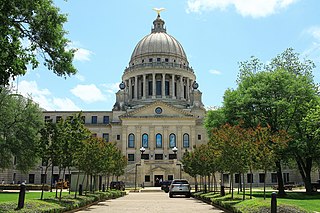
Jackson is the capital of and the most populous city in the U.S. state of Mississippi. Along with Raymond, Jackson is one of two county seats for Hinds County. The city had a population of 153,701 at the 2020 census, a significant decline of 173,514, or 11.42%, since the 2010 census, representing the largest decline in population during the decade of any major U.S. city. Jackson is the anchor for the Jackson metropolitan statistical area, the largest metropolitan area located entirely in the state and the tenth-largest urban area in the Deep South. With a 2020 population of nearly 600,000, metropolitan Jackson is home to over one-fifth of Mississippi's population. The city sits on the Pearl River and is located in the greater Jackson Prairie region of Mississippi. Jackson is the only city in Mississippi with a population exceeding 100,000 people.

James Howard Meredith is an American civil rights activist, writer, political adviser, and United States Air Force veteran who became, in 1962, the first African-American student admitted to the racially segregated University of Mississippi after the intervention of the federal government. Inspired by President John F. Kennedy's inaugural address, Meredith decided to exercise his constitutional rights and apply to the University of Mississippi. His goal was to put pressure on the Kennedy administration to enforce civil rights for African Americans. The admission of Meredith ignited the Ole Miss riot of 1962 where Meredith's life was threatened and 31,000 American servicemen were required to quell the violence - the largest ever invocation of the Insurrection Act of 1807.
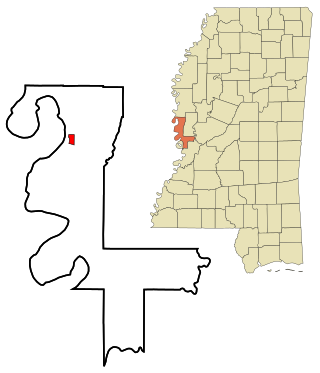
Mayersville is a town on the east bank of the Mississippi River, and the county seat for Issaquena County, Mississippi, United States. It is located in the Mississippi Delta region, known for cotton cultivation in the antebellum era. Once the trading center for the county, the town was superseded when railroads were built into the area. The population of the majority-black town was 547 at the 2010 census, down from 795 at the 2000 census.
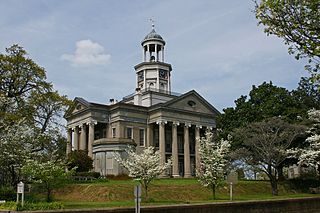
Vicksburg is a historic city in Warren County, Mississippi, United States. It is the county seat and has a population as of 2020 of 21,573. Located on a high bluff on the east bank of the Mississippi River across from Louisiana, Vicksburg was built by French colonists in 1719. The outpost withstood an attack from the native Natchez people. It was incorporated as Vicksburg in 1825 after Methodist missionary Newitt Vick. The area that is now Vicksburg was long occupied by the Natchez Native Americans as part of their historical territory along the Mississippi. The first Europeans who settled the area were French colonists who built Fort Saint Pierre in 1719 on the high bluffs overlooking the Yazoo River at present-day Redwood. They conducted fur trading with the Natchez and others, and started plantations. During the American Civil War, it was a key Confederate river-port, and its July 1863 surrender to Ulysses S. Grant, along with the concurrent Battle of Gettysburg, marked the turning-point of the war. The city is home to three large installations of the United States Army Corps of Engineers, which has often been involved in local flood control. After the war came Reconstruction and then a violent return to power by white supremacists and the Democrat Party in 1874 and 1875. Vicksburg's population is majority African American.

Freedom Summer, also known as the Freedom Summer Project or the Mississippi Summer Project, was a volunteer campaign in the United States launched in June 1964 to attempt to register as many African-American voters as possible in Mississippi. Blacks had been restricted from voting since the turn of the century due to barriers to voter registration and other laws. The project also set up dozens of Freedom Schools, Freedom Houses, and community centers such as libraries, in small towns throughout Mississippi to aid the local Black population.

Hiram Rhodes Revels was an American Republican politician, minister in the African Methodist Episcopal Church, and a college administrator. Born free in North Carolina, he later lived and worked in Ohio, where he voted before the Civil War. Elected by the Mississippi legislature to the United States Senate as a Republican to represent Mississippi in 1870 and 1871 during the Reconstruction era, he was the first African American to serve in either house of the U.S. Congress.
An African American is a citizen or resident of the United States who has origins in any of the black populations of Africa. African American-related topics include:

The history of the state of Mississippi extends back to thousands of years of indigenous peoples. Evidence of their cultures has been found largely through archeological excavations, as well as existing remains of earthwork mounds built thousands of years ago. Native American traditions were kept through oral histories; with Europeans recording the accounts of historic peoples they encountered. Since the late 20th century, there have been increased studies of the Native American tribes and reliance on their oral histories to document their cultures. Their accounts have been correlated with evidence of natural events.
The civil rights movement (1865–1896) aimed to eliminate racial discrimination against African Americans, improve their educational and employment opportunities, and establish their electoral power, just after the abolition of slavery in the United States. The period from 1865 to 1895 saw a tremendous change in the fortunes of the black community following the elimination of slavery in the South.

Rev. William Henry Jernagin was an African-American Baptist pastor, an important figure in the civil rights movement (1896–1954), and Pan-African activist. The National Race Congress selected Jernagin to attend the Paris Peace Conference and the First Pan-African Congress in 1919.
Irvin Charles Mollison was a judge of the United States Customs Court.
The Arkansas State Press was an African-American newspaper published from 1941 to 1959. Dubbed "Little Rock's leading African-American newspaper," its owners and editors were Daisy Bates and L. C. Bates. According to historians, the newspaper was "believed by many to be instrumental in bringing about the desegregation of the Little Rock public schools."
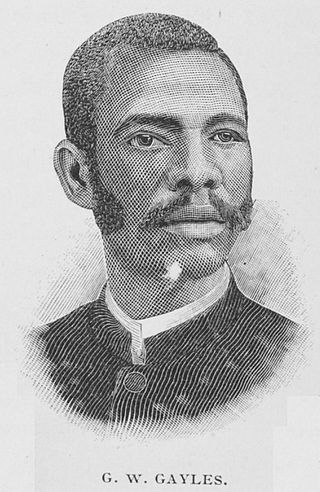
George Washington Gayles was an American Baptist minister and state legislator in Mississippi. He was in the Mississippi House of Representatives from 1872 until 1875 and to the Mississippi Senate from 1878 until 1886. He was a candidate for United States House of Representatives in 1892, but received only 6% of the vote due to the voter suppression laws of that period. He was also a noted Baptist minister and was known as the "Father of the Convention" of African American Baptists in Mississippi.

Irvine Garland Penn was an American educator, journalist, and lay leader in the Methodist Episcopal Church. He was the author of The Afro-American Press and Its Editors, published in 1891, and a coauthor with Frederick Douglass, Ida B. Wells, and Ferdinand Lee Barnett of The Reason Why the Colored American Is Not in the World's Columbia Exposition in 1893. In the late 1890s, he became an officer in the Methodist Episcopal Church and played an important role advocating for the interests of African Americans in the church until his death.
John F. Harris was an American lawyer and politician from Greenville, Mississippi. In the mid- and late-1880s he was a member of the Greenville city council and in 1890 he was elected to the Mississippi House of Representatives. He was also a member of numerous local civic organizations. He is noted for an 1890 speech given to the state house in support of an appropriations bill for a monument to Confederate veterans of the American Civil War.
The Mississippi Enterprise was one of two African American newspapers in Jackson, Mississippi. Arrington High worked at the paper. Publication years include 1939–1980. The paper covered lynchings and murders of African Americans. It advocated for African Americans to support African-American businesses in Mound Bayou, Mississippi, a historically African-American community founded by freed slaves. The Library of Congress has an archive of the paper.
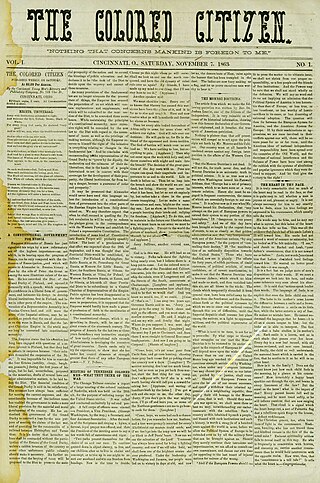
Colored Citizen and The Colored Citizen were newspapers published for African Americans in the United States. Newspapers using the title were published in many cities including in 1867 in Vicksburg, Mississippi during the Reconstruction era, the state's first newspaper for African Americans. Many of the papers seem to have existed only briefly.

The Enterprise was an African American newspaper in Omaha, Nebraska, United States, published from 1893 to 1914. Originally edited by George F. Franklin, the paper changed hands and was edited by Thomas P. Mahammitt for the bulk of its life. Compared to its contemporary African American paper in Omaha, the Afro-American Sentinel, it focused less on faith and culture, and had a more cautious view of war. The paper spawned the creation of a competitor, the short-lived Progressive Age, and after the paper folded, the Mission Monitor was expanded to fill its void.












